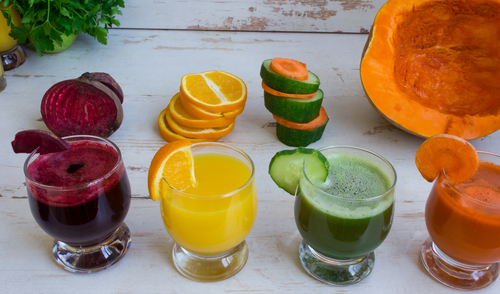Short answer
In moderation and when supplemental to a regular healthy diet, juicing can be a beneficial way to add fruits and vegetables to your diet.
More beneficial to your health than not. However, harmful qualities are most likely associated and shouldn't be overlooked.
View Full Grading System
Category 'A'
Very healthy and numerous health benefits. Side effects are rare. Things rated an 'A+' are typically necessary for survival (for example, water).
Very healthy and numerous health benefits. A few harmful qualities may be associated, but only under certain circumstances such as an allergic reaction.
Very healthy and numerous health benefits. Harmful qualities may be associated, but aren't usually serious.
It is important to note that even the best things in life can become bad in immoderate amounts. So, although something may be rated an 'A+', overconsumption/overdoing can bring unwanted effects.
Category 'B'
Very beneficial to your health. Things rated a 'B+' may have a few harmful qualities to pay attention to.
Overall beneficial to your health. Things rated a 'B' may have some harmful qualities to pay attention to.
More beneficial to your health than not. However, harmful qualities are most likely associated and shouldn't be overlooked.
The main difference between category 'A' and category 'B' is the harmful qualities typically present in 'B' items. Serious side effects are usually uncommon, but are still possible and should be taken note of.
Category 'C'
Both beneficial and harmful qualities associated. Things rated a 'C+' are typically a bit more on the beneficial side. Still, moderation is important.
A fairly even ratio of beneficial and harmful qualities. Moderation is important. Very general topics that can lean towards both sides of the spectrum will be placed here as well. Rice, for example, can be good or bad depending on the type.
More harmful than beneficial. Side effects are common, especially when consumed/done excessively. Moderation is very important.
Category 'C' usually denotes to both good and bad qualities. When it comes to this category, it is important to keep this word in mind: moderation.
Category 'D'
Harmful to your health. Although benefits may be associated, the bad most likely outweighs the good. Moderation is very important.
Harmful to your health. A few benefits may be associated, but the bad outweighs the good. Moderation is extremely important.
Harmful to your health. Very few, if any, benefits are present. Things in this category should be avoided as much as possible.
Category 'D' is typically for things that are more harmful than beneficial. While consuming/doing something unhealthy once in a blue moon shouldn't hurt, we definitely recommend eliminating 'D' items as a regular part of your routine/diet.
Category 'F'
Category 'F' is for things that fail to bring anything beneficial to the table, and are very harmful to your health. We recommend completely avoiding anything in this category. Long-term side effects of 'F' items are usually very serious.
Category 'N'
'N' stands for neutral. Things placed into this category are generally (a) neither good nor bad for you, or (b) lack the necessary evidence to reach any conclusions.
Long answer
There are various reasons people juice their vegetables and fruit such as detoxing the body and simply including more of them in their day to day diet. Many people find it difficult to get their 4 servings each of fruit and vegetables in each day, but juicing greatly cuts down the volume of these foods into just 1-2 glasses of juice goodness. That’s amazing!
Including these foods in your diet every day is a great way to get your necessary vitamins and minerals. Whole fruit consumed in its natural state also provides a ton a fiber, while juicing removes nearly 90% of the fiber. Fiber is great for your gut and bowel health, helps in lowering your cholesterol levels, controlling blood sugar level and helps in maintain a healthy weight. But, did you know fiber is also commonly bound to antioxidants in foods? While some of these antioxidants pass into the juice, many are lost during the juicing process. For those juicing for the purpose of cleansing toxins from the body, losing these 2 types of nutrients, fiber and antioxidants, makes this a bit difficult. Antioxidants are generally responsible for detoxifying the liver by creating glutathione to neutralize free radicals. Fiber binds to toxins in the gut to eliminate them from the body.
Doing a juicing cleanse is safe for a few days but not many, as it typically gives you less than 1,000 calories for the day and provides no protein or fats. For this reason, juicing is not a sufficient regular meal replacement. Remember, you must eat (healthy) fats to burn (bad) fats. Having fats in your diet also makes it possible for your body to absorb fat-soluble vitamins A, D, E and K which support the health of blood, bones, skin and eyes. A study by Wojcicki and Heyman in 2012 found that long-term consumption of 100% fruit juices can increase the risk of metabolic syndrome, liver damage and obesity. This can largely be associated with the fructose sugar of the fruit juice without a balance of fiber which can increase your risk of developing type 2 diabetes.
Possible short-term side effects
- decreased absorption of fat-soluble vitamins
Possible long-term side effects
- diabetes
metabolic syndrome
-
liver damage
-
obesity
Ingredients to be aware of
- excess amounts of fructose
Benefits
- supplies vitamins and minerals
-
helps meet the recommended serving sizes of fruits and veggies
Please turn your Ad Blocker off to see this content. Thank you!
Thank you for your feedback!
Written by Kristin Brown, DC, MS
Published on: 08-08-2016
Last updated: 12-10-2016
Thank you for your feedback!
Written by Kristin Brown, DC, MS
Published on: 08-08-2016
Last updated: 12-10-2016

 Approved by
Approved by 















